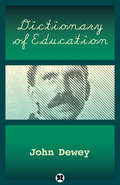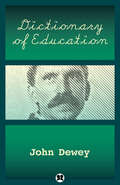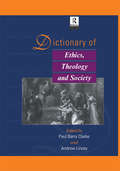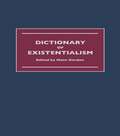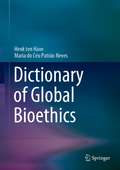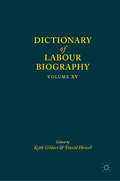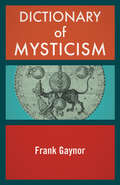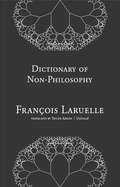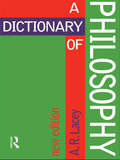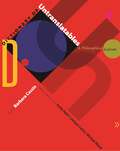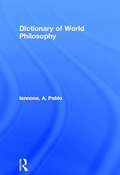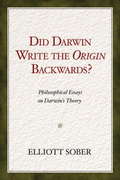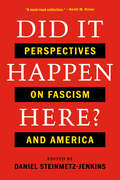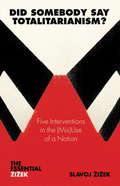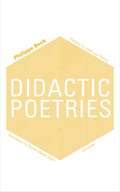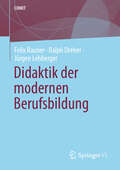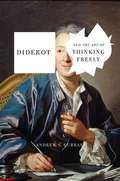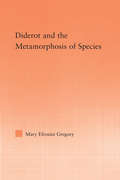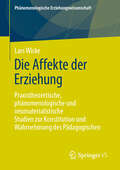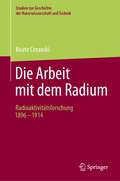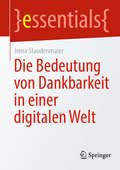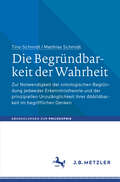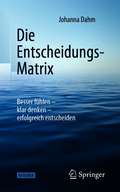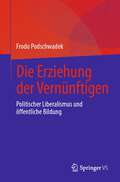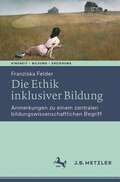- Table View
- List View
Dictionary of Education
by John DeweyDictionary of Education is a comprehensive resource on John Dewey's approach to education. With smart, concise definitions pertaining to Dewey's philosophies, editor Ralph B. Winn has constructed a classic dictionary and indispensable tool for anyone who wants ready access to Dewey's most incisive thought on crucial points in the study of education.
Dictionary of Education
by John DeweyThis comprehensive A-to-Z resource covers the eminent philosopher&’s influential theories on education.One of the most prominent American philosophers of the twentieth century, John Dewey was also a major proponent of educational reform. He wrote extensively on teaching and pedagogy in works such as The School and Society, The Child and the Curriculum, and Democracy and Education, among others.Dictionary of Education is an authoritative reference volume on the subject of Dewey&’s approach to learning. With smart, concise definitions, editor Ralph B. Winn has constructed an indispensable tool for anyone who wants ready access to Dewey&’s ideas and his particular usage of terminology.
Dictionary of Ethics, Theology and Society
by Andrew Linzey Paul A. ClarkeThis Dictionary provides a unique and groundbreaking survey of both the historical and contemporary interrelations between ethics, theology and society. In over 250 separately-authored entries, a selection of the world's leading scholars from many disciplines and many denominations present their own views on a wide range of topics.Arranged alphabetically, entries cover all aspects of philosophy, theology, ethics, economics, politics and government. Each entry includes:* a concise definition of the term* a description of the principal ideas behind it* analysis of its history, development and contemporary relevance* a detailed bibliography giving the major sources in the fieldThe entire field is prefaced by an editorial introduction outlining its scope and diversity.Selected entries include:Animal Rights * Capital Punishment * Communism * Domestic Violence * Ethics * Evil * Government * Homophobia * Humanism * Liberation Theology * Politics * Pornography * Racism * Sexism * Society * Vivisection * Women's Ordination
Dictionary of Existentialism
by Haim GordonExistentialism, as a philosophy, gained prominence after World War II. Instead of focusing upon a particular aspect of human existence, existentialists argued that our focus must be upon the whole being as he/she exists in the world. Rebelling against the rationalism of such philosophers as Descartes and Hegel, existentialists reject the emphasis placed on man as primarily a thinking being. Freedom is central to human existence, and human relations and encounters cannot be reduced simply to "thinking." This Dictionary provides--through alphabetically arranged entries--overviews of the various tenets, philosophers, and writers of existentialism, and of those writers/philosophers who, in retrospect, seem to existentialists to espouse their philosophy: Nietzsche, Kierkegaard, Dostoyevski, et al.
Dictionary of Global Bioethics
by Henk ten Have Maria do Patrão NevesThis Dictionary presents a broad range of topics relevant in present-day global bioethics. With more than 500 entries, this dictionary covers organizations working in the field of global bioethics, international documents concerning bioethics, personalities that have played a role in the development of global bioethics, as well as specific topics in the field.The book is not only useful for students and professionals in global health activities, but can also serve as a basic tool that explains relevant ethical notions and terms. The dictionary furthers the ideals of cosmopolitanism: solidarity, equality, respect for difference and concern with what human beings- and specifically patients - have in common, regardless of their backgrounds, hometowns, religions, gender, etc. Global problems such as pandemic diseases, disasters, lack of care and medication, homelessness and displacement call for global responses.This book demonstrates that a moral vision of global health is necessary and it helps to quickly understand the basic ideas of global bioethics.
Dictionary of Labour Biography: Volume XV
by David Howell Keith GildartThe Dictionary of Labour Biography has an outstanding reputation as a reference work for the study of nineteenth and twentieth century British history. Volume XV maintains this standard of original and thorough scholarship. Each entry is written by a specialist drawing on an array of primary and secondary sources. The biographical essays engage with recent historiographical developments in the field of labour history. The scope of the volume emphasises the ethnic and national diversity of the British labour movement and neglected political traditions.
Dictionary of Mysticism: Dictionary Of Mysticism, Encyclopedia Of Superstitions, And Dictionary Of Magic
by Frank GaynorMore than 2,200 terms defined in an essential reference on religious mysticism, esoteric philosophy, occultism, and more. Dictionary of Mysticism provides concise definitions for more than 2,200 terms used in many philosophies, religions, and doctrines which relate to the influence of the superhuman and supernatural on man&’s everyday life. Terms relating to esoteric philosophy, occultism, religious mysticism, spiritualism, alchemy, and psychical research are defined. Particular attention is given to the Eastern philosophies of Buddhism, Brahmanism, Sufism, Lamaism, Zoroastrianism, Theosophy, and Cabbalism. Also included are terms used in magic and demonology.
Dictionary of Non-Philosophy (Univocal)
by François LaruelleIn The Dictionary of Non-Philosophy, the French thinker François Laruelle does something unprecedented for philosophers: he provides an enormous dictionary with a theoretical introduction, carefully crafting his thoughts to explain the numerous terms and neologisms that he deems necessary for the project of non-philosophy. With a collective of thinkers also interested in the project, Laruelle has taken up the difficult task of creating an essential guide for entering into his non-standard, non-philosophical terrain. And for Laruelle, even the idea of a dictionary and what a dictionary is become material for his non-philosophical inquiries. As his opening note begins, &“Thus on the surface and within the philosophical folds of the dictionary, identity and its effect upon meaning are what is at stake.&”
Dictionary of Philosophy
by Alan LaceyProviding an illuminating and informed introduction to central philosophical issues, concepts and perspectives in the core fields of metaphysics, epistemology and philosophical logic, the Dictionary takes the most common terms and notions and clarifies what they mean to the philosopher and what sort of problems the philosopher finds associated with them.Thoroughly revised and updated, the bibliographies supply core reading lists, and each entry uses extensive cross referencing to related themes and concepts to provide a greater sense of access, control and comprehension.The Dictionary will also provide those working in proximate fields with an understanding of areas of overlapping interest, concepts of common applicability and the full range and diversity of philosophical analysis and insight.
Dictionary of Untranslatables: A Philosophical Lexicon (Translation/Transnation #35)
by Barbara CassinCharacters in some languages, particularly Hebrew and Arabic, may not display properly due to device limitations. Transliterations of terms appear before the representations in foreign characters.This is an encyclopedic dictionary of close to 400 important philosophical, literary, and political terms and concepts that defy easy—or any—translation from one language and culture to another. Drawn from more than a dozen languages, terms such as Dasein (German), pravda (Russian), saudade (Portuguese), and stato (Italian) are thoroughly examined in all their cross-linguistic and cross-cultural complexities. Spanning the classical, medieval, early modern, modern, and contemporary periods, these are terms that influence thinking across the humanities. The entries, written by more than 150 distinguished scholars, describe the origins and meanings of each term, the history and context of its usage, its translations into other languages, and its use in notable texts. The dictionary also includes essays on the special characteristics of particular languages--English, French, German, Greek, Italian, Portuguese, Russian, and Spanish.Originally published in French, this one-of-a-kind reference work is now available in English for the first time, with new contributions from Judith Butler, Daniel Heller-Roazen, Ben Kafka, Kevin McLaughlin, Kenneth Reinhard, Stella Sandford, Gayatri Chakravorty Spivak, Jane Tylus, Anthony Vidler, Susan Wolfson, Robert J. C. Young, and many more.The result is an invaluable reference for students, scholars, and general readers interested in the multilingual lives of some of our most influential words and ideas.Covers close to 400 important philosophical, literary, and political terms that defy easy translation between languages and culturesIncludes terms from more than a dozen languagesEntries written by more than 150 distinguished thinkersAvailable in English for the first time, with new contributions by Judith Butler, Daniel Heller-Roazen, Ben Kafka, Kevin McLaughlin, Kenneth Reinhard, Stella Sandford, Gayatri Chakravorty Spivak, Jane Tylus, Anthony Vidler, Susan Wolfson, Robert J. C. Young, and many moreContains extensive cross-references and bibliographiesAn invaluable resource for students and scholars across the humanities
Dictionary of World Philosophy
by A. Pablo IannoneThe Dictionary of World Philosophy covers the diverse and challenging terminology, concepts, schools and traditions of the vast field of world philosophy. Providing an extremely comprehensive resource and an essential point of reference in a complex and expanding field of study the Dictionary covers all major subfields of the discipline.Key features:* Cross-references are used to highlight interconnections and the cross-cultural diffusion and adaptation of terms which has taken place over time* The user is led from specific terms to master entries which provide valuable historical and cultural context* Each master entry is followed by at least two suggestions for further reading on the subject, creating a substantial bibliography of world philosophy* References extend beyond philosophy to related areas such as cognitive science, computer science, language and physicsSubdisciplines covered include:* aesthetics * ethics * sociopolitical philosophy * the philosophy of law * epistemology * logic * the philosophy of science * the philosophy of mind * the philosophy of culture and history * metaphysics * the philosophy of religionEntries are drawn from West Africa, Arabic, Chinese, Indian, Japanese, Jewish, Korean, Latin American, Maori and Native American philosophy including the important and so far largely neglected instance of Pre-Hispanic thought: Nahua philosophy.
Did Darwin Write the Origin Backwards?
by Elliott SoberIs it accurate to label Darwin's theory "the theory of evolution by natural selection," given that the concept of common ancestry is at least as central to Darwin's theory? Did Darwin reject the idea that group selection causes characteristics to evolve that are good for the group though bad for the individual? How does Darwin's discussion of God in The Origin of Species square with the common view that he is the champion of methodological naturalism? These are just some of the intriguing questions raised in this volume of interconnected philosophical essays on Darwin. The author's approach is informed by modern issues in evolutionary biology, but is sensitive to the ways in which Darwin's outlook differed from that of many biologists today. The main topics that are the focus of the book--common ancestry, group selection, sex ratio, and naturalism--have rarely been discussed in their connection with Darwin in such penetrating detail. Author Professor Sober is the 2008 winner of the Prometheus Prize. This biennial award, established in 2006 through the American Philosophical Association, is designed "to honor a distinguished philosopher in recognition of his or her lifetime contribution to expanding the frontiers of research in philosophy and science." This insightful collection of essays will be of interest to philosophers, biologists, and laypersons seeking a deeper understanding of one of the most influential scientific theories ever propounded.
Did It Happen Here?: Perspectives on Fascism and America
by Daniel Steinmetz-JenkinsAn essential primer for the thoughtful citizen. Since the election of Donald Trump, politicians, historians, intellectuals, and media pundits have been faced with a startling and urgent question: Are we threatened by fascism? Some see striking connections between our current moment and the tumultuous interwar period in Europe. But others question if these connections really reflect our current political moment or if they are another example of Eurocentrism and American provincialism speaking over a much more complex global political landscape.? Did It Happen Here? collects, in one place, key texts from the sharpest minds in politics, history, and the academy beginning with classic pieces by Hannah Arendt, Angela Davis, Reinhold Niebuhr, Leon Trotsky, and others. The book’s contemporary contributors include Ruth Ben-Ghiat on the trivialization of the term “fascism,” Jason Stanley and Sarah Churchwell on the Black radical perspective, and Robert O. Paxton on Trump. These writers argue firmly that fascism is alive and well in America today, but another set of contemporary voices disagree. Samuel Moyn demonstrates the limitations of historical comparison. Rebecca Panovka examines the uses and abuses of Hannah Arendt’s work. Anton Jager and Victoria De Grazia make the case that the social and communal conditions necessary for fascism do not exist in the United States. Still others, like Priya Satia and Pankaj Mishra, are critical of the narrow framework of this debate and argue for a global perspective. Did it Happen Here? brings together a range of brilliant intellectuals, offering vital takes on our evolving political landscape. The questions posed by editor Daniel Steinmetz-Jenkins is one that readers will be debating for decades to come. Is fascism significantly influencing—even threatening to dominate—modern American politics? Is it happening here?
Did Somebody Say Totalitarianism?
by Slavoj ZizekIn some circles, a nod towards totalitarianism is enough to dismiss any critique of the status quo. Such is the insidiousness of the neo-liberal ideology, argues Slavoj i ek. Did Somebody Say Totalitarianism? turns a specious rhetorical strategy on its head to identify a network of family resemblances between totalitarianism and modern liberal democracy. i ek argues that totalitarianism is invariably defined in terms of four things: the Holocaust as the ultimate, diabolical evil; the Stalinist gulag as the alleged truth of the socialist revolutionary project; ethnic and religious fundamentalisms, which are to be fought through multiculturalist tolerance; and the deconstructionist idea that the ultimate root of totalitarianism is the ontological closure of thought. i ek concludes that the devil lies not so much in the detail but in what enables the very designation totalitarian: the liberal-democratic consensus itself.From the Trade Paperback edition.
Didactic Poetries (Univocal)
by Philippe BeckComplex, haunting, imaginative and profoundly literary, Didactic Poetries is Beck&’s response to Schiller&’s statement: &“We are still waiting for a didactic poem where thought itself would be and would remain poetic,&” and Hegel&’s claim that, &“strictly speaking, didactic poetry isn&’t poetry.&”For the acclaimed French poet, Philippe Beck, Schiller&’s task of attempting a didactic poetry remains as vital today as it was for Schiller&’s time. Is there a way to construct a poetry built and chiseled, hammered and stitched, from out of past narratives and poetries, condensed in such a manner as to make new poetic verses sing new truths? Forging a singular attempt to echo the poets and tales of a bygone age, Beck&’s didactic poetries perhaps carve out the path for renewing a poetic thought as a quasi-musical atmosphere where the reader can glimpse &“A small country &“sculpted&” as spiritual, supposed to be so at home in the Bygone Country. Alluvial layers so light, that weather disappeared, weary of variety a priori.&” Beck&’s deftly textured poems interweave contemporary commentary with cultural, historical, literary, and philosophical allusions, drawing the reader into a world of lived poetic experience.
Didaktik der modernen Berufsbildung (COMET)
by Felix Rauner Jürgen Lehberger Ralph DreherDie Didaktik der modernen Berufsbildung definiert als Bildungsziel die Förderung beruflicher Gestaltungskompetenz. Sie orientiert sich dabei an der KMK und deren Rahmenvereinbarung von 1991, in welcher die „Befähigung zur (Mit-)Gestaltung der Arbeitswelt und der Gesellschaft in sozialer und ökologischer Verantwortung“ als Ziel beruflicher Bildung formuliert wurde. Daran soll sich die Gestaltung, Organisation und Evaluation der beruflichen Bildung an beiden Lernorten unverändert orientieren. Diese Leitidee fordert die holistische (vollständige) Lösung beruflicher Aufgaben und zielt darauf ab, als Bildungsmoment jeweils lösungsrelevante Kriterien in ihrer Gewichtung und Konkretisierung gegeneinander abwägen zu müssen. Wir beschreiben in diesem Buch, wie es der Didaktik der modernen Berufsbildung gelingt, das Konzept der holistischen Aufgabenlösung auf der Ebene des Arbeitsprozesswissens durch drei aufeinander aufbauenden Wissensniveaus zu differenzieren: dem handlungsleitenden (Know That), handlungserklärendem (Know How) und dem handlungsreflektierendem Wissen (Know Why). Dazu beziehen wir uns auf die in einem internationalen Projekt entwickelte Methode der Kompetenzentwicklung und Kompetenzevaluation COMET. Durch die Fokussierung auf Gestaltungskompetenz und deren Messbarkeit über COMET erreicht die Didaktik der modernen Berufsbildung eine neue Qualität der Differenzierung ihrer Fragestellungen und Ergebnisse in ihrer Forschung und der Berufsbildungspraxis.
Diderot and the Art of Thinking Freely
by Andrew S. CurranA spirited biography of the prophetic and sympathetic philosopher who helped build the foundations of the modern world. <P><P>Denis Diderot is often associated with the decades-long battle to bring the world's first comprehensive Encyclopédie into existence. But his most daring writing took place in the shadows. <P><P>Thrown into prison for his atheism in 1749, Diderot decided to reserve his best books for posterity--for us, in fact. <P><P>In the astonishing cache of unpublished writings left behind after his death, Diderot challenged virtually all of his century's accepted truths, from the sanctity of monarchy, to the racial justification of the slave trade, to the norms of human sexuality. <P><P>One of Diderot's most attentive readers during his lifetime was Catherine the Great, who not only supported him financially, but invited him to St. Petersburg to talk about the possibility of democratizing the Russian empire. <P><P>In this thematically organized biography, Andrew S. Curran vividly describes Diderot's tormented relationship with Rousseau, his curious correspondence with Voltaire, his passionate affairs, and his often iconoclastic stands on art, theater, morality, politics, and religion. <P><P>But what this book brings out most brilliantly is how the writer's personal turmoil was an essential part of his genius and his ability to flout taboos, dogma, and convention.
Diderot and the Metamorphosis of Species
by Mary GregoryIn this study Dr. Gregory examines how Diderot borrowed from Lucretius, Buffon, Maupertuis, and probability theory, and combined ideas from these sources in an innovative fashion to hypothesize that species are mutable and that all life arose randomly from a single prototype.
Die Affekte der Erziehung: Praxistheoretische, phänomenologische und neumaterialistische Studien zur Konstitution und Wahrnehmung des Pädagogischen (Phänomenologische Erziehungswissenschaft #15)
by Lars WickeEmotionen und Affekte spielen in der Erziehung eine zentrale Rolle. Allerdings wird dieser Zusammenhang bislang vor allem mithilfe psychologischer Ansätze beleuchtet. Dabei geraten soziale Dimensionen der Erziehung aus dem Blick. Dieses Buch fragt demgegenüber in Bezug auf praxistheoretische, phänomenologische und neumaterialistische Affektverständnisse nach der Konstitution und Wahrnehmung von Erziehung als einem sozialen Phänomen. Im Zentrum steht die These, dass Erziehung im dynamischen Zusammenwirken von Praktiken und Diskursen und in den Beziehungen zwischen menschlichen und nicht-menschlichen Körpern entsteht und vor dem Hintergrund der darin enthaltenen affektiven Dimensionen intelligibel wird. In der Interpretation von videografierten Szenen aus Kita, Schule und Universität werden Figuren des Affektiven ausgearbeitet, in denen jene Momente der Konstitution und der Wahrnehmung des Pädagogischen, auch in ihrer Untrennbarkeit voneinander, deutlich werden. Der Affektbezug erscheint dabei selbst als Methode und insofern als Bezugspunkt einer relationalen Theorie und Empirie des Pädagogischen.
Die Arbeit mit dem Radium: Radioaktivitätsforschung 1896 -1914 (Studien zur Geschichte der Naturwissenschaften, Medizin und Technik - Studies on the History of Sciences, Medicine and Technology)
by Beate CeranskiDieses Buch macht die überraschende Vielfalt der Personen und Tätigkeiten in der Radioaktivitätsforschung sichtbar. Dabei wird der Begriff der wissenschaftlichen Arbeit neu konzeptualisiert. Neben die Forschungsarbeit im Labor treten scheinbare Rand-, Neben- und Routinetätigkeiten, die für die Radioaktivitätsforschung als Disziplin von zentraler Bedeutung waren.Badeärzte, Industriechemiker und Bergbaubeamte waren an der Erforschung der neuen Substanzen und Strahlen ebenso beteiligt wie eine vergleichsweise hohe Zahl von Frauen. Die erste umfassende Studie zur deutschsprachigen Radioaktivitätsforschung im vorderen Teil des Buches offenbart die Ausnahmestellung der Hauptstädte Berlin und Wien für die Forschung ebenso wie fruchtbares akademisches Leben in der Provinz; sie zeigt, wie das neue Gebiet an den Hochschulen in die Lehre einzog und welchen Beitrag Professoren, Privatdozenten und Promovierende zur Forschung leisteten. Erstmals wird auch die Bedeutung der Wasseruntersuchungen aufgezeigt, die durch die Hoffnung auf radioaktive Heilquellen angetrieben wurden.Im zweiten Teil werden in internationaler Perspektive unsichtbare und in der Geschichtsschreibung oft wenig beachtete Facetten der „Arbeit mit dem Radium“ untersucht. So mussten Instrumente und radioaktive Präparate überhaupt erst hergestellt und in Umlauf gebracht werden. Auch die Etablierung von Nachweismethoden für Radioaktivität erforderte viel Arbeit, von der niemand sprach. Dienstleistungen wie die Entwicklung therapeutisch nutzbarer Präparate, Gutachtertätigkeiten, die Herausgabe einer Zeitschrift oder die Organisation eines Kongresses werden als integraler Bestandteil der wissenschaftlichen Arbeit in ihrer Bedeutung dargestellt. Eine Reflexion zur Arbeitsorganisation und zum disziplinären Status bündelt die Ergebnisse in einer neuen Gesamtsicht auf die frühe Radioaktivitätsforschung.
Die Bedeutung von Dankbarkeit in einer digitalen Welt (essentials)
by Irena StaudenmaierDieses inspirierende Büchlein erinnert uns daran, warum es wichtig ist, inmitten der digitalen Revolution dankbar zu sein. Mit praktischen Übungen, inspirierenden Geschichten und einer ermutigenden Perspektive ist es eine wertvolle Ressource für jeden, der nach mehr Erfüllung und Zufriedenheit in einer digitalen Welt sucht. Es bietet einen einzigartigen Blickwinkel auf Dankbarkeit in einer digitalisierten Welt. Die Autorin unterstützt mit praktischen Ratschläge und Übungen, die helfen, die vorgestellten Konzepte im eigenen Leben anzuwenden.
Die Begründbarkeit der Wahrheit: Zur Notwendigkeit der ontologischen Begründung jedweder Erkenntnistheorie und der prinzipiellen Unzulänglichkeit ihrer Abbildbarkeit im begrifflichen Denken (Abhandlungen zur Philosophie)
by Matthias Schmidt Tino SchmidtAusgangspunkt dieses Buches ist die Frage, inwieweit Wissen objektiv begründbar ist und inwieweit unsere Aussagen in ihrem Anspruch als wahr zu gelten, einen Bezug zu einer unabhängig von unserem subjektiven Erleben gegebenen Welt notwendig voraussetzen müssen. Insgesamt soll gezeigt werden, dass erstens jeder Wahrheitstheorie korrespondenztheoretische Annahmen (d.h. Wahrheit ist Übereinstimmung einer Aussage bzw. eines Gedankens mit der Wirklichkeit) in irgendeiner Weise zugrundeliegen müssen. Zweitens dass jedoch jede Form der Korrespondenztheorie notwendig entweder zu in sich widersprüchlichen Systemen führt (v.a. Kant, Fichte, Hegel, Aristoteles und Popper) oder zu sich abkapselnden Doktrinen, die per se nicht falsifizierbar sind (Thomas von Aquin, die Stoiker, Platon, Wittgenstein, Habermas). Schlussfolgerung: Da jede Erkenntnistheorie korrespondenztheoretische Grundannahmen beinhalten muss (z.B. der ontologische Grundsatz einer Entsprechung von Sein und Bewusstsein), liegt in ihnen stets eine Erklärungslücke vor.
Die Entscheidungs-Matrix: Besser fühlen – klar denken – erfolgreich entscheiden
by Johanna DahmWie gelingt es uns, in einer Multioptions-Gesellschaft gut zu entscheiden und die Entscheidung rasch umzusetzen? Entscheidungen fallen nicht immer leicht und manchmal verlieren wir uns im Abwägen von Handlungs-Alternativen, in Pro-Contra-Listen in komplexen Strategien und überfordernden Techniken. Dabei bewirken diese sowohl im Privatleben als auch in komplexen Management-Situationen eher den Entscheidungsaufschub als das übergeordnete Handlungsziel. Die Entscheidungsexpertin und Unternehmensberaterin Johanna Dahm erläutert die Ursachen nicht getroffener Entscheidungen: Anhand sechs einfacher Fragen in Alltags- und Unternehmens-Situationen zeigt sie, wie persönliche Motive zu Aufschieberittis, Stress und Folgekosten für Privatpersonen und Organisationen führen können. Zugleich zeigt Sie anhand der Entscheidungs-Matrix, wie Entscheidungen leichter fallen und zeigt auf, wie wir auch in scheinbar ausweglosen Situationen handlungsfähig bleiben und klug entscheiden können. Ein inspirierendes Buch für alle, die beruflich, persönlich und privat erfolgreich Entscheidungen treffen und intuitiv-logisch von Krisen- und Turnaround-Managern lernen wollen, um dem steigenden Entscheidungsdruck heute und in Zukunft gewachsen zu sein.Zur Autorin: Johanna Dahm ist gefragte Beraterin, Referentin und Keynote-Speaker zum Thema Entscheidung. Seit 1999 begleitet sie internationale Unternehmen, Personal-Entscheider und auch Einzelpersonen in Fragen von Führung, Entwicklung und Veränderung.
Die Erziehung der Vernünftigen: Politischer Liberalismus und öffentliche Bildung
by Frodo PodschwadekDieses Buch bietet die erste ausgearbeitete Darstellung politisch-liberaler Bildung und verbindet eine gründliche Analyse der theoretischen Grundlagen mit anwendungsorientierten Ansätzen für zeitgenössische pädagogische Herausforderungen. Neben einer eingehenden Auseinandersetzung mit den Unzulänglichkeiten der Rawls'schen Theorie und der Erörterung einiger zentraler Einwände gegen neutralitätsbasierte Beschränkungen in der Bildung bietet der Band eine aufschlussreiche Diskussion von Themen wie gleichgeschlechtliche Beziehungen in der Sexualerziehung, die Stellung von Kindern mit Migrationshintergrund und das Recht religiöser Eltern, die Erziehung ihrer Kinder zu bestimmen. Das Buch skizziert ein politisch-liberales Bildungsverständnis, das einen nützlichen Beitrag zu den aktuellen Debatten über Liberalismus und Bildung leistet, wie er in der bisherigen Literatur zum politischen Liberalismus nicht zu finden ist. Es ist von Interesse für alle, die an der Schnittstelle von politischer Philosophie und Bildungsphilosophie arbeiten, sowie für Wissenschaftler, die ein breiteres Interesse daran haben, wie der Liberalismus auf die Herausforderungen des Wertepluralismus reagieren kann.
Die Ethik inklusiver Bildung: Anmerkungen zu einem zentralen bildungswissenschaftlichen Begriff (Kindheit – Bildung – Erziehung. Philosophische Perspektiven)
by Franziska FelderBeginnend in den frühen 2000er Jahren ist Inklusion in den letzten Jahrzehnten immer stärker in den Fokus (praktischer, theoretischer wie empirischer) Bildungsbemühungen gerückt. Insbesondere die Sonderpädagogik, aber nicht nur sie, ist mit einer nie dagewesenen Entwicklung konfrontiert. Inklusion zweifelt die Existenzberechtigung der Sonderpädagogik an und fordert auch die Allgemeine Pädagogik mit ihren Ausschlussmechanismen heraus. Viele Debatten und unzählige Veröffentlichungen in der Inklusionspädagogik berühren direkt praktische und politische Umsetzungsfragen – von Fragen der Didaktik und Methodik inklusiven Unterrichts, bis hin zur Frage, wie Lehrpersonen entsprechende inklusive Einstellungen entwickeln können. Relativ spärlich aber gestaltet sich der inklusive Grundlagendiskurs. Insbesondere fehlen Ansätze zur ethischen Grundlegung inklusiver Bildung weitgehend. Dabei wäre das genau wichtig, denn Umsetzungsfragen berühren in pädagogischen Kontexten immer auch normative Zielperspektiven. Genau an diesem Punkt setzt das Buch an. Es fragt u.a. danach, welche deskriptive Aussagekraft dem Begriff der Inklusion zukommt, welche ethisch-normative Basis Inklusion hat und was davon in der pädagogischen Anwendung zentral ist. Das Buch thematisiert weiter auch, welchen Stellenwert Behinderung in dieser ganzen Debatte hat. Und nicht zuletzt befragt es eine Reihe von Mythen in der Inklusionsliteratur nach ihrer Plausibilität, u.a. dass Inklusion mit der Akzeptanz von Heterogenität gleichgesetzt werden kann oder dass eine radikale Dekategorisierung zu mehr Inklusion führen führt.
